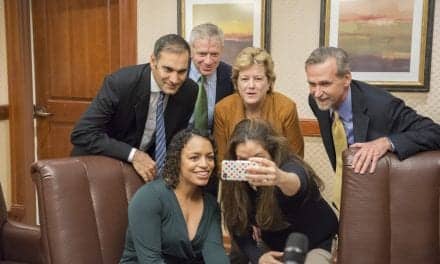
Social media marketing tools are sprouting like fruit flies, and everyone not already “tweeting” and “friending” is wondering whether or not to tweet or friend in the future. It’s a communications firestorm. In the midst of it all, may I point out something blindingly obvious?
Think of “social media” as just another term for cultivating relationships. And as a physician, you are already knee-deep in relationships. You have lots of tools in place to cultivate those relationships. When you spend extra time in the consultation room with a prospect or patient, allowing you to relax, shoot the breeze, and just enjoy talking, that is relationship marketing.
When you return a phone call from a Web site lead and give that person the benefit of your expertise, that is relationship marketing. It is when you spend time with your staff and obtain their opinions, your relaxed attitude trickles down to everyone who walks into your office, improving relationships continuously.
When you answer queries from your Web site by e-mail, you’re starting a new relationship. By posting a Web blog with interactive links, you invite communication—also known as a relationship.
Sending an e-newsletter with real information of genuine value to your patients is relationship building, as is the practice of hosting patient-appreciation events where you greet every attendee.
If you’re doing a few or all of these things, you have plenty of opportunities to do what social media is all about.
EFFECTIVE RELATIONSHIP MARKETING
What makes for good relationship marketing? One word: Generosity. Be generous in giving your patients plenty of attention.
If you’re a bad listener (ask your spouse), learn to listen. Take a course if you have to. Deep listening and the art of drawing people out are skills that can be learned. The techniques are so simple, computers can be programmed to do it. Psychologist Carl Rogers once programmed a computer to probe people’s psyches. It was so convincing, his secretary got hooked on it.
Lavish your expertise on phone callers, e-mailers, and in casual conversation. Every time you demonstrate your expertise, you’ve performed in a mini-commercial for your practice.
Don’t think of these encounters as wasted time—they’re inexpensive marketing events.
A client of mine has been giving away iPads in contests and raffles. He could more cheaply offer cosmetic procedures as prizes, but that wouldn’t create the same aura of munificence as the iPads. As aesthetic procedures are widely seen as luxuries, rewarding loyal patients with trendy, high-end electronics seems only fitting.
Contests, by the way, are not hokey or tawdry. They create involvement, which is what relationships are all about. Everybody loves to hit a jackpot once in a while. It’s human nature. Behavioral research shows that intermittent rewards are the most effective at training rats (and people) to repeat certain behaviors.
If you hold a contest, make sure you announce the results. Maximize involvement. If your contest involved people responding to a question, you can write whole blogs and e-newsletters about who said what, who came in second and third, etc. This answers the persistent question, “What in the world will I write about this week (or month)?” More to the point, it turns the spotlight on your patients and reinforces their feelings of community.
DON’T BE GRABBY
Let’s say you have a contact-us box on your Web site. Visitors can leave some basic information, and you respond to their questions. Don’t ask the inquirer for too much information. Don’t make her surrender her name, address, phone number, e-mail address, areas of interest, etc.
TALKING POINTS
Relationship marketing is social media in real time.
- Spend extra time in the consultation room relaxing and enjoying a talk with a prospect or patient.
- When you return a phone call from a Web site lead, describe your expertise openly.
- This relaxed attitude trickles down to everyone who walks into your office, improving relationships continuously.
- Spend time with your staff and obtain their opinions.
- By posting a Web blog with interactive links, you invite communication—and that creates a relationship.
- Sending an e-newsletter with valuable information to patients is relationship building.
- Host patient-appreciation events where you are present and greeting each attendee.
This makes you look like a tit-for-tat negotiator. The more information you ask for, the more people perceive you as stingy and grasping. They know their information is valuable. You’re seen as guarding your precious expertise by demanding all kinds of personal information up front.
If you want people to trust you—the biggest hurdle in a prospective client’s decision to hire an aesthetic practitioner or surgeon—you need to banish any suspicion that you’re making them an offer just to capture their personal information.
If you go ahead and try to capture too much of that information up front, you will lose the business. Web site visitors will move on rather than slow down long enough to fill out a long form. People browsing the Web are like hummingbirds, fast moving and impatient. They skip past anything that breaks the rhythm of scanning and clicking.
The only information you should ask for is enough to reach out and answer their inquiry: a phone number or an e-mail address.
BE FUNNY, IF POSSIBLE
While useful information is great, useful information packaged with a smile and a wink is irresistible. This applies especially to blogs and e-newsletters, which most people read at work. They’re bored. They’d love a bright spot in their day. When your e-newsletter or blog post arrives, if you write entertainingly they’ll fall on it like hungry jackals.
I’m not talking about Robin Williams-level humor, but an ironic aside or tongue-in-cheek remark every now and then. Something parenthetical. Wit is mind candy that will bring your readers back again and again.
TIME IS YOUR FRIEND
If it seems as though all of this takes too much time and you’d rather delegate it to a practice manager while you get on with more important business, you need to change the way you think about time.
For your patients, time is a dark enemy. It bears down on them inexorably, bringing dreaded consequences. These consequences just happen to be the source of your riches. In that sense, you’re in the catbird seat regarding time. Time is your best friend.
Take that bounty the Goddess of Time has granted you and lavish it on the people most likely to use your services—your loyal patients. Relationship marketing gets more efficient over time.
You know how one significant look from your spouse can communicate a world of meaning? A similar telescoping happens on a lesser scale in all relationships. The longer you communicate, the more meaning and bonding you squeeze into a millisecond of exposure.
Like compound interest, relationship marketing builds on its own capital. As more trust is packed into each moment of relating, efficiency soars.
The stronger your bonds with patients and prospects become, the more you’re guaranteed their business over their entire lifetimes. The lifetime value of a cosmetic patient has been estimated at more than $100,000. That’s the figure you need to think about when you’re lingering on the phone with an inquisitive prospect, as opposed to a single-procedure charge.
CONCLUSION
When it comes to growing an aesthetic practice, don’t be preoccupied with the quick sale, the fast deal, or the number of new patients you attract every year. Those have their place, but they should not be the centerpieces of your marketing strategy.
Instead, spend marketing time on the other side of the equation: building relationships by relaxing and really listening to everyone who expresses an interest in what you can do for them.
While the jury’s still out on whether new online social media are cost-effective for small businesses, there’s no doubt at all that the best clients you’ll ever have are the ones who are aware of you for a long, long time before they call you.
Joyce Sunila is an e-marketing specialist to aesthetic practitioners. Her Web site, Practice Helpers, is available at www.practicehelpers.com. Joyce can be reached at .





